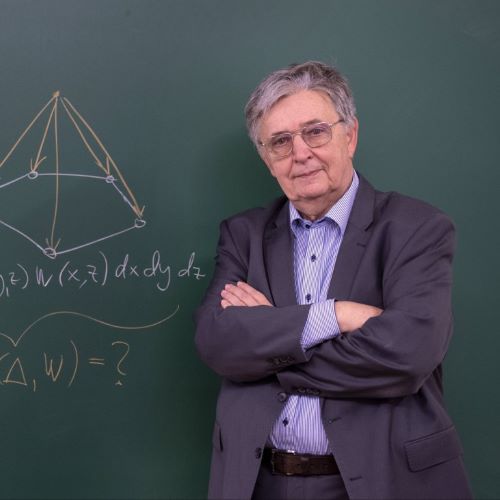
“This year, mathematician László Lovász will receive the Erasmus Medal of the European Academy of Sciences, which he will receive at the institution's annual conference on October 16. The scientist gave an interview to InfoRádió.
The award also means recognition of mathematics within the sciences, which often does not receive the attention it deserves. The results of his work in the field of discrete mathematics and computer science are used, among other things, in checking the security of computers," said mathematician László Lovász, former president of the Hungarian Academy of Sciences, research professor at the HUN-REN Rényi Institute, in response to questions from InfoRádió. In the interview, he also spoke about the beginnings of his relationship with mathematics, his career, and the significance of the award.
“They also wrote about you in the citation that you created a kind of connection between discrete mathematics and computer science. What exactly does this mean, and how can it be perceived in practice by an average person? Do you encounter their results?
Yes, to some extent, these are things that are used in everyday life. Some of my results are used in computer systems, for example, in checking the security of computers. Within mathematics, there are traditionally two trends, two areas or research opportunities. One is continuous mathematics. The whole of classical physics is based on working with concepts such as speed and acceleration, which are described by so-called differential equations, which can be calculated, and then you can say what orbit a satellite will fly in. The other trend or area is discrete mathematics. It deals with things that are separable, usually finite, like the neurons in a nervous system, which can be separated from each other. But we can also talk about the whole society as a structure, something that needs to be studied and understood, but it is not a continuous medium; it consists of individuals, and these individuals interact with each other, and in this way, they create various phenomena, from politics to epidemics to all kinds of elements of the economy. It is called discrete mathematics, which deals with such things. It was a slightly looked-down-upon branch of mathematics in the 1960s. I think it is because the other branch, the description of movements, continuous mathematics, has achieved enormous success. We actually already have satellites, we understand planetary orbits, and many other things like that. That is why discrete mathematics was pushed into the background a bit. But then came computers, and computers are fundamentally discrete in structure. They consist of discrete transistors, they are interconnected, and their operation must be understood. Then later came computer networks, where computers are the basic elements, and you have to understand their connection and the resulting system of relationships. This is how discrete mathematics connects with computers, which brought about enormous progress starting in the 70s and 80s.
What are you doing now?
I have always been excited by the fact that these seemingly different branches of mathematics are interconnected, and recently, in the last two decades, with an ever-changing focus. I am concerned with how finite discrete structures, like the internet or human society, or even a network of cells in a living being, can be described, or perhaps approached, with these very, very effective methods that are used in continuous classical mathematics and physics. I am also currently working on a part of this. I have an excellent small research group at the Rényi Institute with whom we are working on this, with the support of a European grant that we won. So the point is to connect certain very effective methods that have been developed for discrete structures with other or seemingly different methods that others have developed for continuous structures. This is what we are dealing with, this is what excites us now."
The full interview can be read HERE.
